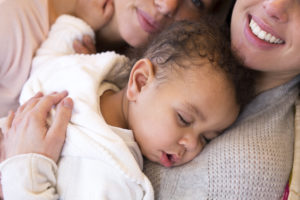 CSSP’s Young Children and Their Families (YCF) team joins the loud chorus of voices from around the country in celebration of children and parents who identify as lesbian, gay, bi-sexual, transgender, or questioning (LGBTQ). Like all parents, those who identify as LGBTQ want what is best for their children and hold big dreams for their futures. Children who identify as LGBTQ or who are gender non-conforming need the same unconditional love and support from their parents and other caring adults as all children do. All families, regardless of family members’ sexual orientation, gender identity and expression (SOGIE), have their own unique strengths and challenges. And all parents, regardless of SOGIE, need support from time to time. Early childhood professionals are a key source of such support. Through everyday interactions, professionals in the fields of early care and education, health, and family support build close relationships with families that promote child and family well-being. In the remaining days of Pride Month, we highlight a few resources for families and early childhood providers in support of LGBTQ children and families. Happy Pride Month!
CSSP’s Young Children and Their Families (YCF) team joins the loud chorus of voices from around the country in celebration of children and parents who identify as lesbian, gay, bi-sexual, transgender, or questioning (LGBTQ). Like all parents, those who identify as LGBTQ want what is best for their children and hold big dreams for their futures. Children who identify as LGBTQ or who are gender non-conforming need the same unconditional love and support from their parents and other caring adults as all children do. All families, regardless of family members’ sexual orientation, gender identity and expression (SOGIE), have their own unique strengths and challenges. And all parents, regardless of SOGIE, need support from time to time. Early childhood professionals are a key source of such support. Through everyday interactions, professionals in the fields of early care and education, health, and family support build close relationships with families that promote child and family well-being. In the remaining days of Pride Month, we highlight a few resources for families and early childhood providers in support of LGBTQ children and families. Happy Pride Month!
___
These resources from the National Center on Parent, Family and Community Engagement offer tips for early childhood providers on creating a welcoming program for LGBTQ families. Written for Head Start and Early Head Start programs, these resources are also relevant to a wide range of early childhood programs and settings, from Center-based and Family Child Care to Pre-kindergarten classrooms to home visiting programs. They include: Partnering with Parents Who Identify as LGBT, A Checklist for Programs, Children’s Books that Include Diverse Family Structures, and Resources about Diverse Family Structures.
This CSSP blog post on Gender, Sexuality and Parenting (October, 2017) explores key questions about SOGIE and parenting: How should parents respond when their young children embrace a gender identity and/or expression that doesn’t line up with expectations? How should parents respond when their teenage or young adult children come out? What commitments do foster and adoptive parents make to accept the children and young people they bring into their families? On the other side of the parenting equation, does a parent’s SOGIE matter to their ability to love and nurture children? Should parents’ SOGIE be taken into consideration as systems try to find homes for the children needing families in this country?
With partners at Family Builders By Adoption in Oakland, California, CSSP’s getR.E.A.L. initiative developed a guide, Raising Healthy and Happy LGBT & Gender Non-Conforming Children, to help parents navigate what may be unfamiliar terrain. Birth parent, foster parent or adoptive parent, it boils down to being loving, supportive, accepting and open with your child, and advocating for them with other people or institutions (like church or school) that may not be as supportive.
“Lesbian, Gay, Bisexual and Transgender Parents,” Facts for Families No. 92 from the American Academy of Child and Adolescent Psychiatry dispels myths related to the outcomes for children raised by LGBTQ parents compared to those for children from heterosexual families. The report concludes that it is the quality of the parent relationships with young children that affects their development.
—
Anna Lovejoy is a senior associate at CSSP.